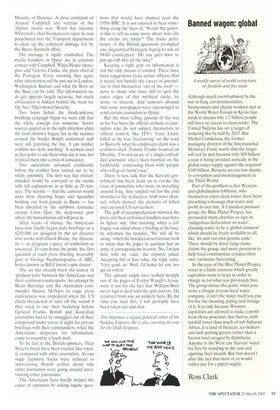Banned wagon: global
A weekly survey of world restrictions on freedom and free trade Although much overshadowed by the war in Iraq, environmentalists, businessmen and charity workers met at the World Water Forum in Kyoto last week to discuss why 1.2 billion people still have no access to clean water. The United Nations has set a target of reducing this by half by 2015. But Michel Camdessus, the former managing director of the International Monetary Fund, warns that the target will not be met because only $80 billion a year is being invested annually in the global water supply against the required $180 billion. Returns are too low thanks to corruption and mismanagement in the Third World.
Part of the problem is that Western anti-globalisation lobbyists, who themselves enjoy clean water, have been preaching a message that water and profit do not mix. A Canadian pressure group, the Blue Planet Project, has persuaded many charities to sign its 'indigenous declaration on water', claiming water to be a 'global common' which should be freely available to all, like 'air and our own genetic code'. There should be fewer large dams, claims the group, and more provision to help local communities conduct their own 'rainwater harvesting'.
In the eyes of the Blue Planet Project, water is a finite resource which greedy capitalists want to seize in order to charge us for what was previously free. The group misses the point; when you write a cheque to your local water company, it isn't the water itself you pay for but the cleaning, piping and storage of it. It is only because Western capitalists are allowed to make a profit from those processes that Surrey, with rainfall lower than much of sub-Saharan Africa, is a land of Jacuzzis, ice-makers and lush putting-greens rather than a barren land ravaged by diphtheria. Anyone in the West can 'harvest' water for free by standing in the rain and opening their mouth. But that doesn't alter the fact that most of us would rather pay for a piped supply.
Ross Clark








































































 Previous page
Previous page